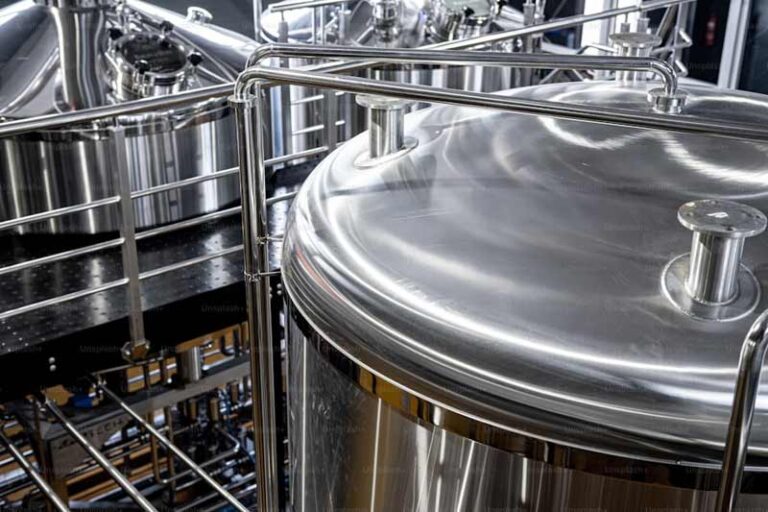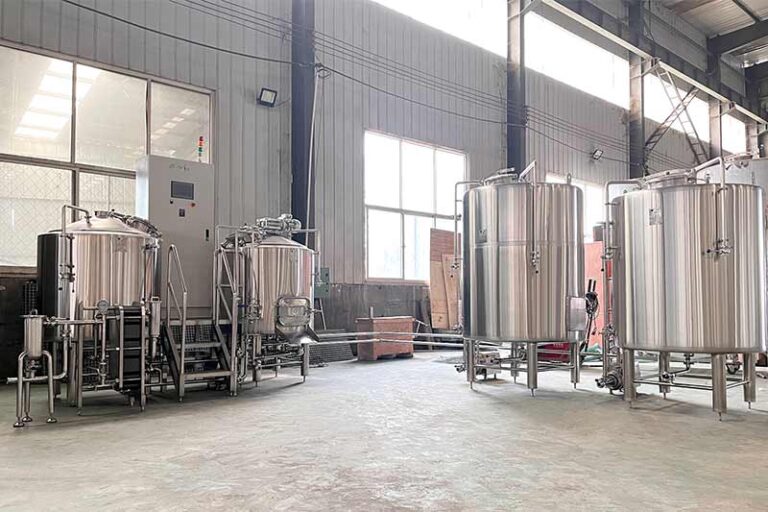There are several factors to consider when purchasing major equipment for your brewery. A brewery can be divided into two main parts, the first is the brewhouse, which is where the first stage of brewing is completed, from grinding to mashing, and from boiling to cooling the wort. The second part is the cellar, which is where fermentation, conditioning, dry hopping, and everything else that happens turning wort into beer happens. In this guide, we’ll take a look at the basic parts you’ll need and discuss the various options involved.
Table Of Contents
What equipment does a craft brewery need?
Breweries can be 2, 3, 4, or even 5 vessel systems. It will feature a mash, lauter kettle, brew kettle, and whirlpool.
- The mash barrel is where water and malt are mixed to convert starch into sugar
- The lauter barrel is a container used to transfer the sugar liquid (wort); go to the brewing kettle and leaves the malt.
- The brew kettle is where you boil the liquid, sterilize it, change its color, and where you add hops to add bitterness to the beer.
- A whirlpool is a vessel in which you create centrifugal force that leaves a cone as it collects the wort into the fermentation vessel.

Brewery Essentials
heat source
steam heating
Steam heating vessels is quite common and requires a steam generator. This simply converts city water into boiling steam, which is then piped into a steam jacket installed on the vessel. Steam generators are typically powered by natural gas, electricity, or diesel. They require a water softening system, which is often sold with a generator. Steam tends to offer more control than other heating methods because the input of steam can be fine-tuned.
Electric heating
Heated vessels typically use elements similar to those found in ordinary kitchen kettles. They come in a variety of sizes and powers, with the best having 2 or 3 elements that can be turned on and off, providing some degree of control over the heating.
Water tank (HLT)
The HLT stores and heats your brewing water (called wine in British brewing). The best models have at least two heating elements or a steam jacket and require only a small amount of water in the container to start heating. Your HLT should have a level indicator to make calculations easier.
Kettle
A simple heating vessel, with a capacity of only 20 liters, can be used to start heating the wort, thus reducing the time required for boiling. Depending on your space, you may need a condenser. This will allow steam to escape from the closed boiling kettle.
heat exchanger
Used to reduce the temperature of boiling wort before transferring to the fermentation vessel. The most common type in breweries is the plate heat exchanger (PHE). Beer flows through one side, and cold water and glycol (or ice water) flow through the other. There should be at least a thermometer at the beer outlet.
combination vessel
- mash/filter barrel: Perform saccharification, filtration and sparging in the same container to save space and time. If you plan to use step mashing, you will need to use heat.
- Boil Kettle/Whirlpool: A common space-saving device that requires two outlets, one to transfer the clarified wort to the heat exchange unit and the other to empty the kettle at the end of brewing.
- Mash/boil kettle: With this system, you mash the mash, then transfer the mash to a separate lauter tun, and then return the sweet wort to the original vessel for boiling. An cheap method that saves space and allows for step-by-step mashing. The potential disadvantage is that you have to remove any remaining grains very before returning the wort to the boil.
- All-in-one: A simple container that allows you to mash, strain, boil and whirlpool in one container. They usually use a large basket to hold the grain and use winches and cranes to lift it. The entire container can be heated and, in some cases, cooled.
control Panel
Control panels come in many shapes and sizes. Common solutions use simple PID systems to check temperature and control pumps and other motorized operations such as brewhouse paddles, etc. Or, PLC systems offer a touch-screen interface to watch the entire process and set up automated operations.
cellar essentials
Fermenter
The type of fermentation vessel you use depends on the type of beer you want to brew. From simple open containers to pressurized monolithic tanks, there are several things to consider. Many small breweries prefer closed pressure vessels – allowing for natural carbonation and faster turnaround times. Yet, if you plan to bottle your beer, you don’t need a pressure vessel.
regulating tank
These are not necessary for all breweries, but can be a useful addition. Clear beer tanks (or BBTs) are most used to clarify and age beers such as lager, but can also be used to add carbonation. Vertical or horizontal, there are many options.
ice water jug
Many breweries use coolants to maintain fermentation temperature and beer collapse. Ethylene glycol is the most common and is stored in a large tank and then pumped into a jacket within the fermentation vessel.

Other necessities
CIP (Cleaning)
Most small breweries are equipped with a CIP system in their cellars and brewery vessels – a simple spray ball that sprays a cleaning solution at high pressure, covering the interior.
A CIP station usually consists of 2 or 3 containers (usually around 50 – 200 liters) connected to a cleaning pump. the station should be mobile to avoid the use of long pipes during cleaning cycles.
Hoses and pipes
Breweries must food-grade, heat-resistant hose that can withstand considerable pressure. You will find high-quality hoses in Romania with ratings up to around 10 bar.
Bottling/canning machine
Whether you use cans or bottles, you need a filling machine. There are many different types to choose from. Especially with bottlers, you need to know whether you want to package carbonated beer or rely on bottle conditioning for carbonation.
Turnkey Craft Brewery
While not all brewery equipment is required, there are several basic items that are considered must-haves for a brewery to ensure seamless operations that produce great-tasting beer. If you also want to open a craft brewery of your own, you can contact MICET. We have advanced brewing equipment and professional customized services.
Get a turnkey solution for brewery equipment
If you plan to open or expand the brewery, you can contact Micet Craft directly. Our engineers will design and manufacture brewery equipment according to your brewing process. Of course, we will also provide you with a complete turnkey solution. Also, if you plan to expand the brewery, we will provide you with customized solutions.

